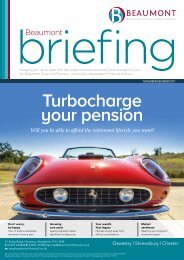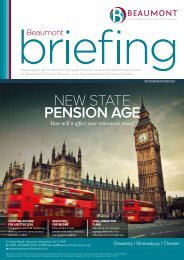sm74 (3)
Create successful ePaper yourself
Turn your PDF publications into a flip-book with our unique Google optimized e-Paper software.
PROTECTION<br />
The good news is that the certain<br />
illnesses that used to be fatal are now<br />
survivable. However, it makes sense<br />
to protect yourself and your family from the<br />
financial fallout, as you’ll need time out to<br />
recover – and that can have a big impact on<br />
you and your family.<br />
HOUSEHOLD WOULD NOT BE<br />
FINANCIALLY SECURE<br />
A fifth of the population (21%) admit that<br />
their household would not be financially<br />
secure for any length of time if it lost<br />
its main income through unforeseen<br />
circumstances, according to research from<br />
Scottish Widows. And more than a third<br />
(36%) would resort to accessing their savings<br />
if they were unable to work. Despite this,<br />
however, only a third (32%) of people have<br />
life insurance, and just one in ten (9%) have<br />
taken out critical illness cover.<br />
Three national cancer awareness<br />
campaigns took place in March this year:<br />
Prostate Cancer, Ovarian Cancer and<br />
Brain Tumour.<br />
The statistics about serious illness are<br />
also striking. Prostate cancer is the most<br />
common cause of cancer in men in the UK,<br />
and one in eight men will be diagnosed<br />
with this illness during their lifetime, while<br />
around 20 women are diagnosed with<br />
ovarian cancer every day [1] . In addition, ten<br />
people a day die of a brain tumour, and<br />
this is the chief cause of cancer deaths in<br />
children and young people [2] .<br />
£4.5 MILLION IN<br />
CRITICAL ILLNESS CLAIMS<br />
Scottish Widows paid out almost<br />
£4.5 million in critical illness claims<br />
relating to prostate cancer, ovarian<br />
cancer and brain tumours in 2015 [3] ,<br />
which collectively accounted for almost<br />
one in ten (9%) of all cancer claims that<br />
year. Almost two thirds (63%) of all critical<br />
illness claims were, in fact, due to cancer.<br />
The average age of diagnosis for<br />
prostate cancer in 2015 was 57, while<br />
the average age for ovarian cancer was<br />
47. More than half (55%) of brain tumour<br />
claimants were male, the youngest being<br />
30 years of age.<br />
FORCED TO BORROW<br />
MONEY FROM PARENTS<br />
The cancer awareness campaigns coincided<br />
with the publication of a new report – No<br />
Small Change – by Macmillan Cancer<br />
Support, which revealed that thousands<br />
of middle-aged people in the UK are<br />
being forced to borrow money from their<br />
parents because of the cost of having<br />
cancer. Macmillan estimates that more<br />
than 30,000 people with cancer in their 40s<br />
have borrowed money from their elderly<br />
parents, and more than 2,000 have moved<br />
in with their parents or parents-in-law after<br />
having to sell their house.<br />
The charity says that 28% of people with<br />
cancer of all age groups – an estimated<br />
700,000 individuals – are vulnerable too<br />
because they have no savings to fall back<br />
on. And for 83% of cancer patients, lost<br />
income and increased expenditure brought<br />
about by the disease costs them an average<br />
of £570 a month.<br />
FAMILIES WHO ARE STRUGGLING<br />
TO COME TO TERMS<br />
At a time when welfare reform is resulting<br />
in significant changes to benefits, it is<br />
important to take time to consider the<br />
arrangements or financial resources<br />
available to you for those ‘what if…’ and<br />
‘how would we..’ scenarios to help ensure<br />
provision is in place to safeguard your<br />
financial future and well-being. Whether<br />
this is achieved by applying for extra cover,<br />
increasing your emergency fund provision<br />
and/or by selling-down your assets, a<br />
strategy should be in place. t<br />
ARE YOU PREPARED IF<br />
LIFE THROWS SOMETHING<br />
UNEXPECTED YOUR WAY?<br />
Critical illness cover pays out a tax-free<br />
lump sum if, during the term that you<br />
select, you are diagnosed with one of the<br />
specified conditions covered by the policy.<br />
It’s entirely up to you how you choose to<br />
spend the money, but you could use it<br />
to pay off your mortgage or other debts,<br />
maybe a holiday to help you recuperate,<br />
or for home modifications such as<br />
building ramps or widening doorways<br />
for wheelchair access. Knowing you<br />
don’t have to worry about your financial<br />
commitments if you’re unable to work can<br />
give you peace of mind. To find out more<br />
about the options available to you, contact<br />
us for further information.<br />
Source data:<br />
[1] Cancer Research UK<br />
[2] Brain Tumour Research<br />
[3] Based on Scottish Widows and Clerical<br />
Medical claims<br />
The Scottish Widows’ protection research<br />
is based on a survey carried out online by<br />
YouGov who interviewed a total of 5,161 adults<br />
between 28 January and 4 February 2016.<br />
IF PREMIUMS ARE NOT MAINTAINED,<br />
THEN COVER WILL LAPSE. THE POLICY<br />
MAY NOT COVER ALL THE DEFINITIONS<br />
OF A CRITICAL ILLNESS. FOR DEFINITIONS,<br />
PLEASE REFER TO THE KEY FEATURES AND<br />
POLICY DOCUMENT.<br />
09
















